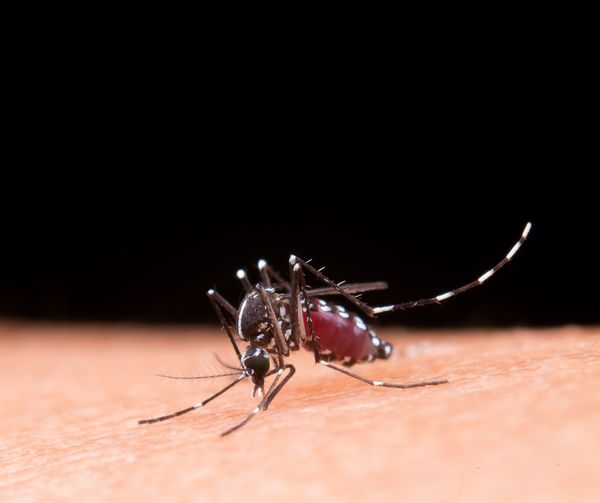
Kyiv (AFP) - Russia said Saturday that it had unleashed hypersonic missiles against an arms depot in Ukraine, the first use of the next-generation weapons in combat, after Kyiv's embattled leader pressed for "meaningful" talks to end a conflict now in its fourth week.
Moscow also said its troops had broken Ukrainian defences to enter the strategic southern port city of Mariupol, and destroyed radio and intelligence sites just outside Odessa.
If confirmed, the use of Russia's new Kinzhal (Dagger) hypersonic missiles, which can elude most defence systems, would mark a new escalation in Russia's campaign to force Ukraine to abandon hopes of closer ties with the West.
Ukrainian air force spokesman Yuri Ignat told AFP that the weapons depot in Deliatyn, a village near the border with Romania, had indeed been hit but "we have no information of the type of missile."
"There has been damage, destruction and the detonation of munitions," he said."They are using all the missiles in their arsenal against us."
Ukraine officials also admitted they had "temporarily" lost access to the Sea of Azov, though Russia has effectively controlled the coastline for weeks after surrounding Mariupol.
Russian President Vladimir Putin, who unveiled the Kinzhal missile in 2018, has termed it "an ideal weapon" that flies at 10 times the speed of sound -- analysts say Russia is leading the hypersonics race, followed by China and the US.
'Time to meet'
Moscow's announcement came hours after Ukrainian President Volodymyr Zelensky again appealed for peace, urging Russia to accept "meaningful" talks in his latest Facebook video.
"This is the time to meet, to talk, time for renewing territorial integrity and fairness for Ukraine," he said.
"Otherwise, Russia's losses will be such that several generations will not recover."
Ukraine claimed Saturday that a Russian general had been killed by strikes on an airfield outside Kherson, just north of Crimea, saying he was the fifth top-ranking officer killed since the invasion began on February 24.
Fierce resistance has managed to stall Russian forces outside Kviv and several other cities in the east, making them vulnerable to Ukrainian attacks against supply lines.
Britain's defence ministry said Saturday that Russia has been forced to "change its operational approach and is now pursuing a strategy of attrition."
"This is likely to involve the indiscriminate use of firepower resulting in increased civilian casualties," it warned.
But as in previous negotiations there appeared to be little progress in reaching a ceasefire, with Putin accusing Ukraine of "numerous war crimes" during a call late Friday with French President Emmanuel Macron.
British Foreign Secretary Liz Truss accused Moscow of using the talks as a "smokescreen" as it carried out "appalling atrocities," saying she was "very sceptical" they would produce a breakthrough.
Fighting rages
Friday's attack on the arms depot was the latest strike in western Ukraine, which until a few days ago had remained relatively unscathed by Russia's push toward key cities from the north and east.
On Friday, Russian forces destroyed an aircraft repair plant near the airport of Lviv, where millions of people have fled as rockets and shelling continue to rain down on Kyiv.
In Mariupol, rescuers were still searching for hundreds of people trapped under the wreckage of a bombed theatre where over 1,000 people had been seeking shelter when it was struck on Wednesday.
There was still no information about potential fatalities, Zelensky said, but 130 people had been saved so far -- some "heavily injured."
"This is no longer Mariupol, it's hell," said resident Tamara Kavunenko, 58. "The streets are full with the bodies of civilians."
Russian forces also carried out a large-scale air strike on Mykolaiv in the south on Friday, killing dozens of young Ukrainian ensigns at their brigade headquarters.
"No fewer than 200 soldiers were sleeping in the barracks" at the time of the attack, a Ukrainian serviceman on the ground, 22-year-old Maxim, told AFP.
"At least 50 bodies have been recovered, but we do not know how many others are in the rubble," he said.
'Trapped'
More than 3.25 million refugees have fled Ukraine and countless others have sought havens in the country's west, though Putin said his forces were doing "everything possible" to avoid civilian casualties during his latest call with Macron, according to the Kremlin.
But Zelensky accused Russian forces of blocking aid around hotspot areas.
"I escaped war to reach stability, only to find myself trapped in another war," said Mazen Dammag, a Yemeni who fled his war-torn homeland nearly six years ago for Ukraine.
He and several friends hired taxis to take them from Odessa to Poland, some 1,000 kilometres north, and eventually Bremen in Germany, where he spoke with AFP by video.
Russia's ally China told US President Joe Biden on Friday that the war "in no one's interest," but showed no sign of giving in to US pressure to join Western condemnation of Russia.
Biden warned his Chinese counterpart Xi Jinping of "consequences" for any financial or military aid for Russia, a move that could turn the standoff into a global confrontation.
Putin appears undeterred by further threats or sanctions, holding a triumphalist rally in Moscow on Friday to mark eight years since Russia's seizure of Crimea, saying his goal in Ukraine was "to rid these people from their suffering and genocide."
Talks stall
In a call to German Chancellor Olaf Scholz, Putin accused Ukrainian authorities of stalling talks by "putting forward more and more unrealistic proposals".
Russia wants Ukraine to disarm and disavow all Western alliances, in particular by joining NATO or seeking closer integration with the European Union -- steps that Kyiv says would turn it into a vassal state of Moscow.
Russia's top negotiator said Friday that Moscow and Kyiv had brought their positions "as close as possible" on a proposal for Ukraine to become a neutral state.
But Mikhailo Podolyak, an advisor to Zelensky taking part in the negotiations, said his country's position had not budged.
Switzerland said Saturday that despite its longstanding neutrality, it would impose the same sanctions against Russia as the EU.
President Ignazio Cassis said his country would not stand by in the "confrontation between democracy and barbarism," saying the war was being driven by "a devastating madness which shatters all the principles and values of our civilisation."
burs-js/yad







